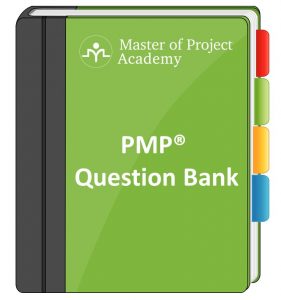After helping 300,000 professionals get their PMP certification with a 99.6% pass rate, my colleagues and I thought it would beneficial to prepare a PMP certification ultimate guide so that many more can benefit and succeed in their careers. This PMP certification ultimate guide will break everything about the PMP into bite size pieces.
This PMP certification ultimate guide also answers the top 10 questions we receive from PMP certification aspirants. We encourage you to read this guide to learn everything about PMP certification.

Content
- About PMP Certification
- Benefits of PMP Certification
- PMP Exam Requirements
- Application for PMP Certification
- Cost of PMP Certification
- PMP Study Plan
- Best Way to Study for PMP
- PMP Exam Questions
- PMP Question Bank
- PMP Renewal Process
- Conclussion
About PMP Certification
First thing to cover will be defining the PMP certification. PMP is an abbreviation of Project Management Professional. The PMI Institute provides PMP certification to professionals who fulfill the PMP eligibility requirements first, and then pass the PMP certification exam successfully.
The PMI (Project Management Institute) was founded in 1969, in Pennsylvania, US by five volunteers who worked in the field of project management. However, it took 14 years to organize their first symposium in 1983, in Atlanta, Georgia. 83 professionals attended the first symposium of PMI institute.

The PMI Institute aimed to prepare a global common language for the project management profession. The best thing to achieve this was by conducting a certification exam and instructing certification exam candidates on a common ground of project management language.
The first PMP certification exam was held at PMI ’84 in Philadelphia, October 6, 1984. Forty-three individuals passed and became the first Project Management Professionals (PMPs). Since then, the importance and reputation of the PMP certification increased gradually. Today, no doubt, the PMP is the world’s most prestigious project management certification around the world and there are millions of PMP certification holders around the world.
Check out What is PMP Video:
By increasing the importance of PMP certification, PMI institute published the PMBOK (Project Management Body of Knowledge) series to ensure a common language of project management. This also helped PMP certification exam candidates understand the exam content.
First PMBOK was published in 1996. Then, the 2nd, 3rd, 4th and 5th versions were published in 2000, 2004, 2009, and 2013 respectively. In each four to five years, PMI prepares a new version of the PMBOK based on changing dynamics of the project management profession and industry. The latest PMBOK is known as the PMBOK 7th version. However, PMI uses both the PMBOK Guide 6th, and the PMBOK Guide 7th Edition for question development.
Recap of this section: PMP is the abbreviation of Project Management Professional and provided by PMI institute to the applicants who fulfill the requirements and pass the exam successfully. PMBOK defines the content of PMP exam.
Benefits of PMP Certification
There are several benefits of PMP certification. The top three benefits are a common language of project management, better salary and an advantage in securing career opportunities.
1-Common Language Benefit of PMP Certification in Project Management World
This is the primary purpose of PMI Institute. Project management is not industry specific. No matter the industry you are work, projects are crucial business drivers that help companies operate and survive in their market. When working with your colleagues, partners, suppliers, or employee of another company, you must be able to speak the same terminology, concepts and processes. Can you communicate with a foreigner if you do not know his language well? Of course not. Same analogy applies here. Project management professionals must be able to understand each other. When a colleague says “scope”, “change request”, “risk register”, “issue log” etc., project management professionals must understand what he or she is referring to.

PMP certification ensures this common language of project management among the PMP certification holders. This eases the communication and management of projects around the world.
2- Better Salary Advantage of PMP Certification
The biggest benefit of PMP certification to the individual is the value of PMP certificate. A PMP certified professional earns up to 20% more than non-certified peers. Based on our previous researches, we found that, in US, a PMP certification holder earns 16% more than a regular project manager who does not have PMP certification.
A PMP certified project manager earns around $110,000 per year in the US. Depending on the industry, experiences and skills of the project manager, this amount can vary. However, this is an average of the reported salaries.
Read more about PMP certification salary and PMP salary distribution in different countries.
3- Advantage of PMP certification in Job Screening
If you are working as a project manager, or looking for a project management job, most of the reputable and corporate companies will look for the PMP certification as a critical merit in candidates. Note the following:
I searched for “project manager” jobs in San Francisco through LinkedIn when I was writing this post and check out what is mentioned about PMP in these project manager job postings.
- Company: Oracle, Position: Technical Project Manager (Link to job posting)
Under preferred qualifications area, following was written: “PMP Certification desired”.
- Company: Glassdoor, Position: Technical Project Manager (Link to job posting)
Under requirements area, following was written “PMP Certification strongly desired.”
- Company: Agfa Healthcare, Position: Project Manager – Healthcare IT (Link to job posting)
On top of the desired skills & experience area following was written: “PMP (Project Management Professional) Certification required”
- Company: E*Trade, Position: IT Project Manager (Link to job posting)
Under requirements area, the following was written: “Achieved a PMP or / and Certified Scrum Master or other project management certification”

There were several job postings and most of them required the PMP certification as a critical requirement. Can you imagine passing screening of these companies without having PMP certification? Especially in today’s harsh job climate, it is almost impossible. Therefore, the PMP certification will help you to surpass other candidates in your project management job applications.
Recap of this section: The PMP certification ensures the common language among project management professionals around the world. The top benefits of the PMP certification are salary increase and stronger chance of securing positions that require project management acumen.
PMP Exam Requirements
You have seen the three major benefits of PMP certification above. You decided to get PMP certification. However, are you eligible to sit for PMP certification exam? PMI has eligibility requirements for the PMP certification. PMP eligibility requirements are categorized in two areas. First one is project management experience and the other one is project management education. Check out the following video to learn about PMP certification requirements.
Let us examine these 2 requirements one-by-one.
1-Project Management Experience Requirement
The PMP certification candidate must have worked in projects in order to be eligible for the PMP certification exam. This requirement changes depending on the highest level of attained education.
- If you have an undergraduate or above level of education, you must have 3+ years of project experience (4,500 hours)
- If you have high school diploma or lower level of education, you must have 5+ years of project experience (7,500 hours).
These are required because PMI wants to assess the theoretical knowledge of the PMP certification exam candidates with their practical experience.
There is a common misconception about the project management experience of PMP certification eligibility requirements. Many people think that in order to be eligible for PMP certification, they must have managed a project. However, PMI clearly states that project management experience here means participating in a project and this might or might not be a leading role. If you have worked as a Business Analyst, System Engineer, Software Developer, or on an IT project, or if you worked as a civil engineer, architect, in a construction project, you will satisfy the project management experience of PMP certification.
2-Project Management Education Requirement
If you have enough project management experience matching with your education level, you must have attend 35 contact hours of project management education as well to be eligible for PMP certification. The term “contact hours” here means that the 35 hours must be instructional. In other words, if you have studied yourself through a PMP material or PMBOK, these will not be counted as contact hours.
In order to satisfy the 35 contact hours project management education requirement, you have to attend a PMP classroom training, PMP live classroom training or online & self-paced PMP training.
It is not a must to obtain all of these 35 contact hours through only one training. You can attend several training sessions and if the total contact hours are over 35, you will be eligible to sit for PMP certification exam. Note that, all of the attained PMP training sessions must be in last five years by the time you apply for the PMP certification.
We have created a quiz that will evaluate your project management experience, education level and contact hours eligibility to determine whether you are eligible to sit for PMP certification exam.
Take PMP Eligibility Quiz
If you meet the level of project experience that matches with your attained education level, you must have attended a 35 contact hours project management education class in the last five years by the time of your PMP certification application.
Application for PMP Certification
There are two ways to apply for the PMP certification: Online PMP application and Paper PMP application. I have been in PMP certification business since 2012 and I haven’t heard anyone using the Paper PMP application method. The main reason is, the online PMP application is more convenient and faster to complete. You can watch the following video to learn more about PMP certification application methods.
If you chose to apply online, you have to create a profile in PMI website (pmi.org) and the PMP application wizard will guide you to fill in your following details respectively:
- Personal Details (Name, Email, Address etc.)
- Attained Education
- Project Management Experience
- Project Management Education
After you completed the PMP application steps, you will be asked to review your PMP application form. Once you submitted your PMP application, it will take 5 calendar days for PMI to review your PMP application.
You can enroll in our FREE PMP Training to learn more about PMP application steps through a real PMP application.
PMP Application Audit
PMI selects some PMP applications for audit. This selection is done randomly and regardless of your PMP application completeness, your PMP application might hit audit as well. If your PMP application hits audit, PMI might ask you to provide following documents
- Diploma or a diploma equivalent document showing your attained level of education
- Reference letters from your colleagues, supervisors or managers as a proof of your project management experience
- Certificate of completion, letter of enrollment and/or curriculum of the attained project management education.
In case your PMP application hits audit, you have to provide the documents regarding your attained level of education and project management experience yourself. However, if PMI asks for your project management education documents, you have to contact your PMP training provider and they have to provide you related documents to pass the PMP audit.
Once you complete the documents required by PMI, you have to send the documents by regular mail to the following PMI address within 90 days after you received the PMI audit email.
Address: PMI
Attn: Certification Audit
14 Campus Blvd. Newtown Square, PA 19073-3299 USA
PMI will review documents and approve your PMP application if the provided documents fulfill the PMP eligibility requirements.
Recap of this section: The recommended path to complete the PMP application is to use the online PMP application. PMI audits PMP applications randomly. Even if you completed your PMP application perfectly, your PMP application might be audited and when you provide the required documents, PMI will approve your PMP application.
Cost of PMP Certification
I categorize PMP certification cost in two different aspects tangible costs and intangible costs. The cost of the PMP certification training and the cost of PMP certification exam are tangible costs. In addition, as a professional, you will spend a significant amount of your time preparing for the PMP certification. I categorize the time you spend studying as an intangible cost of PMP certification.
Let us examine each of these costs one-by-one.
1-PMP Certification Training Cost:
One of the key PMP certification requirements is to attend 35 contact hours project management training. There are three fundamental ways of attending a PMP certification training: in-person classroom training, live virtual classroom training and online self-paced PMP training. Your preference for the PMP training will affect the cost of PMP training and overall cost of PMP certification for you respectively.
Course fees for PMP classroom trainings vary depending on the location. I listed the starting fees of PMP trainings for different locations.
- US, Canada, Australia: ~1500 USD
- South America (Brazil, Chile etc.): ~600 USD
- China, India: ~500 USD
- European Countries (Germany, Italy, Spain etc.): ~1200 USD
- Gulf Countries (UAE, Qatar, Saudi Arabia, Kuwait etc.): ~2000 USD
Course fees for live classroom trainings are slightly lower than the fee of a regular classroom training. Prices of live classroom trainings are in parallel to the regular classroom training fees for each country as well.
The third and the most affordable and convenient option is online PMP certification training. In an online self-paced PMP training, you will have the flexibility to follow the lectures on your own pace and in any place. All you will need will be an internet connected device. Prices of the online self-paced PMP trainings start from as low as $99/month and do not exceed $500 generally.
However, the best aspect of online PMP training and virtual instructor-led PMP training is not its price. Almost every PMP certification aspirant is a working professional and seeks to get the PMP certification while they are working full time in their job. In other words, they have to spare their evenings, weekends or must take days off from their job to attend a classroom training. Even if they can spare the time to sit in the PMP classroom training, it will be challenging to not feeling overwhelmed by attending a five full day in-person project management training.
Therefore, the online self-paced PMP training or the virtual instructor-led training are the optimal methods to attend a PMP training.
2-PMP Certification Exam Fee
After completing and submitting your PMP application form, PMI will evaluate your application in five business days (if you applied online through PMI website).
If PMI approves your PMP certification application, you have to sit for the PMP certification exam within one year of the day of approval. In order to sit for the PMP certification exam, you have to schedule your PMP exam date through Pearson VUE test centers using the PMI website. To do this, you have to pay your PMP exam fee first.
The PMP exam fee is $405 for PMI members and $555 for the candidates who are not a PMI member. However, since PMI membership is around $140, in total, you will be paying $555 anyhow if you opt for being a PMI member as well. Moreover, you will be able to access PMI documents, including the latest version of the PMBOK, for free for one year during your PMI membership.
Therefore, we recommend to become a PMI member in your PMP exam application.
3-Time Spent for PMP Certification Study
The time spent studying is the intangible cost of the PMP certification. Depending on your background and familiarity with the project management, the time you will spend for the PMP certification study will vary accordingly.
However, considering the 35 contact hours of project management training that you need to complete, it will take two to three times more for you to study for PMP certification training. We will dive into the PMP preparation time in PMP study plan section of this post.

Learn all aspects of PMP certification cost
Recap of this section: The PMP certification cost varies depending on your location and project management education preference. If you opt for a PMP classroom training or live classroom training, the cost may rise to $3,000. However, if you opt for an online self-paced PMP training, your total PMP certification cost will be around $1000. Online self-paced PMP training and Instructor-led Virtual PMP training are not only affordable, but also flexible. For online-self-paced PMP training, you can follow the lectures on your own pace in any place. For Instructor-led Virtual PMP training, you can attend classes during the week or on weekend. Apart from the financial cost of PMP certification, you will have to spare around 70-85 hours in total for your PMP certification study.
PMP Study Plan
You know what the PMP certification is. You are eligible to sit for PMP certification exam. You know the tangible and intangible costs for you to get the PMP certification. Finally, you need to prepare for the PMP certification exam! What should you do next? Prepare your own PMP study plan.
PMP preparation takes significant amount of time. Especially, if you are a working professional, your time is valuable and limited to prepare for the PMP certification exam. Therefore, you have to design a solid PMP study plan to pass the PMP certification exam.
After helping over 300,000 professionals pass their PMP certification exam, we prepared a 7 step PMP study plan for working professionals. Let us go through each step of a successful PMP study plan.
1-Determine Target Date for Sitting on PMP Exam
Evaluate your personal schedule and your workload for the upcoming months and decide how much time you can dedicate for your PMP study. Based on our experience, a typical PMP certification study takes around 70-85 hours in total. Note that, this is just an average and depending on your background and skills, your PMP study can be shorter or longer.
Typically, a working professional can spare six hours a week for PMP studying which adds up to about 12-14 weeks in total for PMP study. Therefore, setting your PMP exam target date four to five months ahead will be reasonable.
2-Prepare Your Plan
After setting your PMP exam target date, prepare a detailed plan on what you will study each week until your PMP exam date. PMBOK contains 10 project management knowledge areas and two introductory sections as well.
The content of each knowledge area or section is different. However, aim to complete one section or knowledge area per week. Some of the sections or knowledge areas will take longer to complete while some of them take shorter. Also, some weeks might be busier at work and you might not have enough time for your PMP study. However, if you aim to complete one section or knowledge area per week, it will help you complete your PMP study in four to five months.
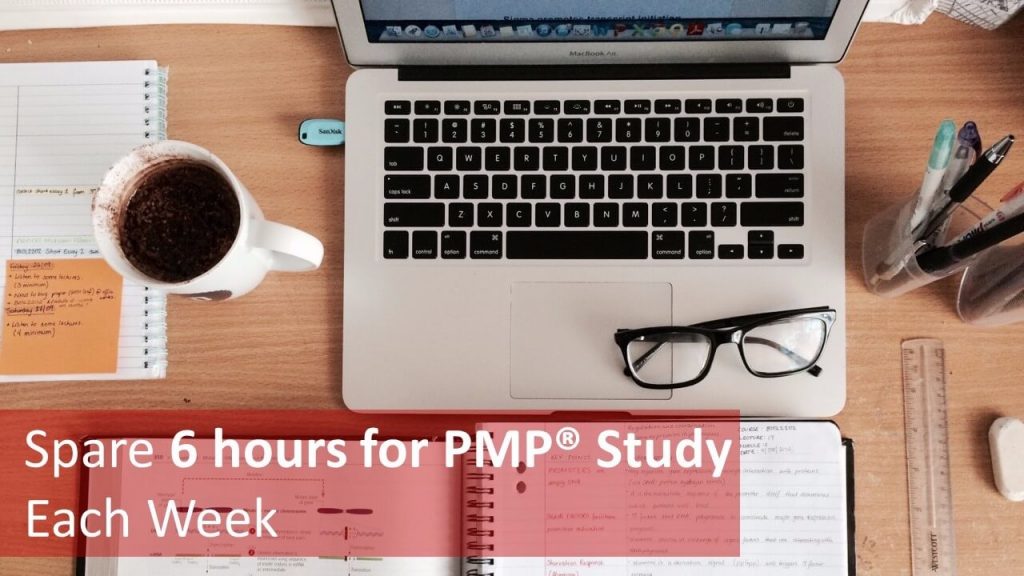
3-Take Notes During Your PMP Study
You will see lots of terms, concepts, and formulas that will require memorization for your PMP certification exam. Since PMP study takes months, we recommend taking notes during your PMP preparation. While you complete new sections or knowledge areas, you can go over your notes to remember the sections you have already completed. This will help keep your knowledge fresh.
4-Practice as Much as Possible
Practice. Practice. Practice. As you continue your PMP certification preparation, we recommend practicing exam questions as much as possible. Practicing as much as possible will allow you to see several different variations of questions that you might face in your real PMP certification exam. This will increase your PMP success tremendously.
5-Review Your Wrong Answers
During your exam question practice, take notes on questions you score incorrectly. Review your wrong answers and take notes why you made the mistake. If you notice you are scoring wrong answers on a particular section or knowledge area, we recommend studying the section again.
6-Go Through Your Notes Frequently
PMP study takes month to prepare for the PMP certification exam. You need to remember what you learned months ago. The best way to do is by going through your notes frequently. Set aside 30 minutes of your weekly PMP study for reviewing your notes to remember the sections you completed already.
7-Go and Get the PMP!
You completed all sections and knowledge areas, you score over 70% from sample PMP exam questions and you feel confident to sit for PMP exam.
Schedule your PMP exam date through Pearson VUE test center. Do not study hard during the last week of your PMP study. Just go through your PMP notes each day to remember the content.

Before the exam date, get good sleep and relax. Plan to appear in the exam center one hour before your PMP exam time to avoid unanticipated delays.
Recap of this section: PMP certification requires significant amount of time to study. Prepare a solid plan and follow your plan to be successful on your PMP certification exam.
Best Way to Study for PMP
Most PMP certification aspirants look for the best way to study for the PMP. There are many approaches to study for the PMP, however, one way that works best for some may not work for you. Therefore, you have to find “your” best way to study for the PMP.
We will give tips to determine your best way to study for the PMP.
The first step is to determine the PMP training best suited for you. There are three fundamental ways of attending a PMP training. PMP classroom training, PMP live classroom training and online self-paced PMP training.
PMP classroom trainings are the traditional way of attending a PMP training. There may be PMP training providers in your city that organize open classroom trainings and you pick the schedule fits your agenda. If you like face-to-face interaction, PMP classroom trainings will be the best option for you. However, many professionals find it tough to arrange their schedule for a PMP classroom training. The main reason is, PMP classroom trainings are organized during evenings after a workday or on weekends to ensure the maximum engagement of working professionals. However, attending a dense 35 hours PMP training after work or during weekends will be painful for a working professional since they give up time they typically allocate to rest.
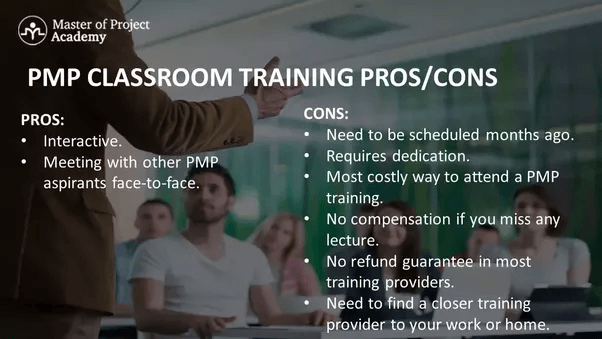
PMP live online classroom training is similar to PMP classroom training in terms of scheduling. However, the difference is, a PMP instructor teaches the class through online mediums (webinar, teleconference etc.) and the PMP certification aspirant must be present on his PC at the time of PMP lecture. Therefore, the PMP candidate must have to adjust their schedule to the schedule of PMP live online classroom training.
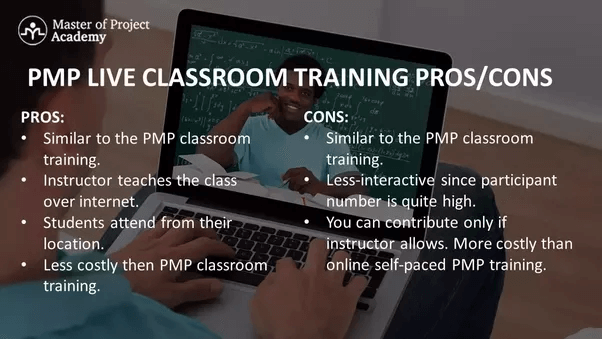
Online self-paced PMP training is the most convenient way to attend a PMP training. All PMP content is recorded and you will be able to watch the same lectures over and over again until you feel confident. The only disadvantage of online self-paced PMP training is, since the PMP instructor is not present in the session, you are unable to ask questions in real time. However, if the PMP training instructor is responsive, as in our courses at Master of Project Academy, you can get responses to your questions in the discussion forum within 24 hours. This makes online self-paced PMP training the most affordable and convenient way to study for PMP certification exam.
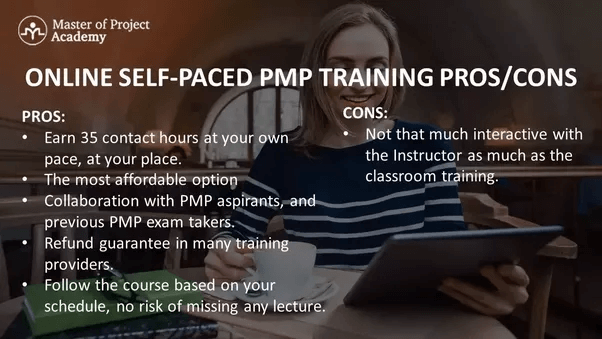
One question we occasionally receive from our PMP certification candidates is, whether they have to study the PMBOK as well. If you are attend a comprehensive PMP training, you will not have to separately study the PMBOK. However, some PMP certification candidates find it better to go through PMBOK as well.
The PMBOK is a tough technical book that concentrates on project management knowledge areas, inputs, outputs and tools & techniques of processes. Therefore, most PMP certification candidates find it difficult to follow PMBOK. We leave it up to the individual to decide if they would like to study the PMBOK.
Consider the tips that we have provided to determine the PMP training and PMP study plan best suited for your PMP journey!
Recap of this section: There is not a single best way to study for the PMP that will work for everyone. You have to determine your own way to study for the PMP certification exam.
PMP Exam Questions
The PMP certification exam contains 200 multiple choice questions. Twenty five of these questions are for monitoring and quality control purposes. They are not scored and do not affect your PMP exam result. However, these 25 questions appear randomly during the exam. Therefore, answer each question carefully during your PMP exam.
PMP exam questions come from five project management groups:
1-Initiating
2-Planning
3-Executing
4-Monitoring & Controlling
5-Closing
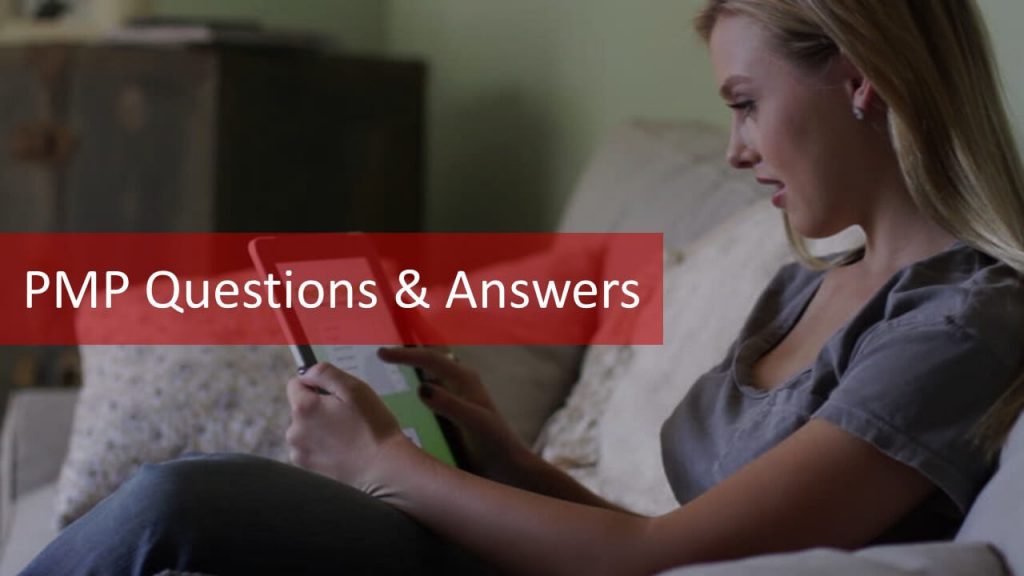
The PMP exam questions assess your technical knowledge, your theoretical knowledge and your practical experience as well. Let’s examine three different PMP exam questions for each of these categories now.
1-Sample PMP Exam Question Assessing Technical Knowledge
During project execution, a team member comes to the project manager because he is not sure of the work needed to accomplish the project. Which of the following documents contain detailed descriptions of work packages?
A-) WBS Dictionary
B-) Activity List
C-) Project scope statement
D-) Scope management plan
Answer is A. WBS Dictionary. Work packages in a Work Breakdown Structure contain only nouns or a couple of words regarding a task or deliverable. Detailed information on what needs to be done, responsible, prerequisites, successors, due date etc. are included in the Work Breakdown Structure Dictionary.
Knowledge Area: Scope Management Knowledge Area
2-Sample PMP Exam Question Assessing Theoretical Knowledge
A schedule performance index, SPI, of 0.75 means:
A-) Project is over budget.
B-) Project is ahead of schedule.
C-) Project is progressing at 75% of the rate originally planned.
D-) Project is progressing at 25% of the rate originally planned.
Answer is C, project is progressing at 75% of the rate originally planned. A, is irrelevant because SPI is a schedule performance index. We cannot derive any conclusion about budget performance of the project with this index. B, is not correct because SPI is less than one, therefore, the project is behind schedule. And D, says that you have completed 25% of the work that you have originally planned, so it’s not correct. The correct answer here is C, because SPI 0.75 means, you have completed 75% of your work that you have originally planned.
Knowledge Area: Cost Management Knowledge Area
3-Sample PMP Exam Questions Assessing Practical Experience
During a meeting with some of the project stakeholders, the project manager is asked to add work to the project scope. The project manager had access to correspondence about the project before the project charter was signed and remembers that the project sponsor specifically denied funding for the scope mentioned by these stakeholders. The BEST thing for the project manager to do is to:
A-) Let the sponsor know of the stakeholders’ request.
B-) Evaluate the impact of adding the scope.
C-) Tell the stakeholders the scope cannot be added.
D-) Add the work if there is time available in the project schedule.
Answer is C. Tell the stakeholders the scope cannot be added. After the scope of a project is finalized and scope baseline is determined, it can be changed only with the approved changed requests. If there is not an approved change request, the existing scope baseline must be valid and project team must work to deliver that scope only. In the scenario, scope is defined already but some stakeholders request to add new work to the scope. This cannot be done unless there is an approved change request. Therefore, stakeholders must be informed that this new work cannot be added.
Knowledge Area: Scope Management Knowledge Area
You can see PMP exam questions and answers in the video below:
During your PMP exam, you will be able to mark questions to review once you go through all questions. Use this feature because many PMP exam questions will be tricky. If you feel unsure when you are answering a question, mark it to revisit later. If you have enough time, you can go over your marked questions again.
Recap of this section: There is not single, best way to study for the PMP that will work for everyone. You have to determine the best way to study for the PMP certification exam.
PMP Question Bank
Getting access to the PMP question bank is popular by PMP certification candidates. As we mentioned earlier, practicing as much as possible is critical in your PMP exam preparation. The more sample PMP exam questions you practice, the better you will perform on the PMP certification exam.
A typical PMP question bank includes several realistic PMP exam questions, answers and rationales as well. When you are practicing PMP exam questions from a PMP question bank, write down your mistakes. Go over your mistakes repeatedly to improve your weak knowledge areas before sitting on your real PMP exam.
If you can score over 70% from a good PMP question bank’s PMP exam questions, you can schedule your PMP certification exam confidently.
Check out the Master of Project Academy PMP Question Bank
You might be interested in the PMP Quick Reference Guide for Math Formulas as well.
Master of Project Academy provides realistic PMP exams. If you score over 70% from these realistic PMP certification exams, you can schedule your PMP exam confidently.
Read more about the PMP question bank.
PMP Renewal Process
After a challenging study, you passed the PMP certification exam and earned your PMP certification. PMI will send your PMP certification to your mailing address as well. You will be able to see your certification in your profile on PMI’s website as well.
Is that it? No. You have to renew your PMP certification every three years to keep your PMP certification valid.
There are 5 steps of PMP renewal process.

Step #1 – Earn 60 PDU (Professional Development Unit): One professional development unit is equivalent to one hour of practicing or education (1 PDU = 1 hour) in project management area. You have to earn 60 PDUs in every three years after you receive your PMP certification or after your renewed your PMP certification.
PMI categorizes project management experience and education in different categories. There are rules and caps for some categories and you can learn more about this process in our PMP renewal post.
Once you earn a PDU from a resource, you have to claim this through PMI’s website to reflect your PMP certification standing.
Step #2 – Fill in the PMP Renewal Application: After you completed 60 PDUs to retain your PMP certification, login to PMI website and fill in your PMP renewal application form.
Step #3 – Confirmation to PMI Code of Ethics: After you completed your PMP renewal application form, you will be asked to reconfirm the PMI code of ethics. Confirm it, and proceed to your PMP renewal process.
Step #4 – Pay the PMP Renewal Fee: After confirming PMI code of ethics, the next step is paying for the PMP renewal fee. You have to pay 60 USD if you are a PMI member to renew your PMP certification. If you are not a PMI member, the PMP renewal fee is 150 USD.
Step #5 – Receive Confirmation of PMP Renewal: After paying for the PMP renewal, your application will be confirmed by PMI.
Then, you have to keep on earning PDUs to retain your PMP certification again in three years.
Conclusion
We called this post as PMP Certification Ultimate Guide. Doesn’t it deserve this title? Starting from the history of PMP certification and PMI, we have gone through every detail of the PMP certification.

We have listed the three major benefits of PMP certification: common language for project management, salary advantage and advantage in project management jobs screening.
Then, we have discussed the PMP exam requirements. We have gone through both the project management experience requirement and the project management education requirement of PMP certification.
We have reviewed the PMP application details and what you should expect in case of a PMI Audit.
There are three major pieces of PMP certification cost: PMP training cost, PMP exam fee and the time you will spend to get ready for the PMP certification exam. We examined each of these three costs one by one.
No doubt, you will need a solid PMP study plan to crack the PMP certification exam. After helping 300,000 professionals in 180+ countries around the world, we prepared a 7 step PMP study plan, and we have gone through each step in this post.
Many PMP certification aspirants look for the best way to study for the PMP. There is not a single way to study and we encourage everyone to find the best way that works for them. However, we provide tips for you to determine your best way to study for PMP certification exam.
We have have gone through the PMP exam structure, the different types of PMP exam questions, and lastly, we provided a link to a free PMP question bank as well.
Finally, we have listed the steps of PMP renewal process.
Note that, this guide has been prepared with the knowledge and experience of helping 300,000+ professionals to pass their certification exams.
Author

Resit Gulec, MBA, PMP, ITIL has over 10 years of work experience. Resit worked in 20+ countries, managed million dollar budget projects and several people. He worked as engineer and manager in multinational companies including Alcatel-Lucent and Ericsson. Resit trained 125,000+ professionals for PMP certification exam since 2014. Resit has appeared in hundreds of media outlets including Yahoo Finance and Wall Street Journal.


